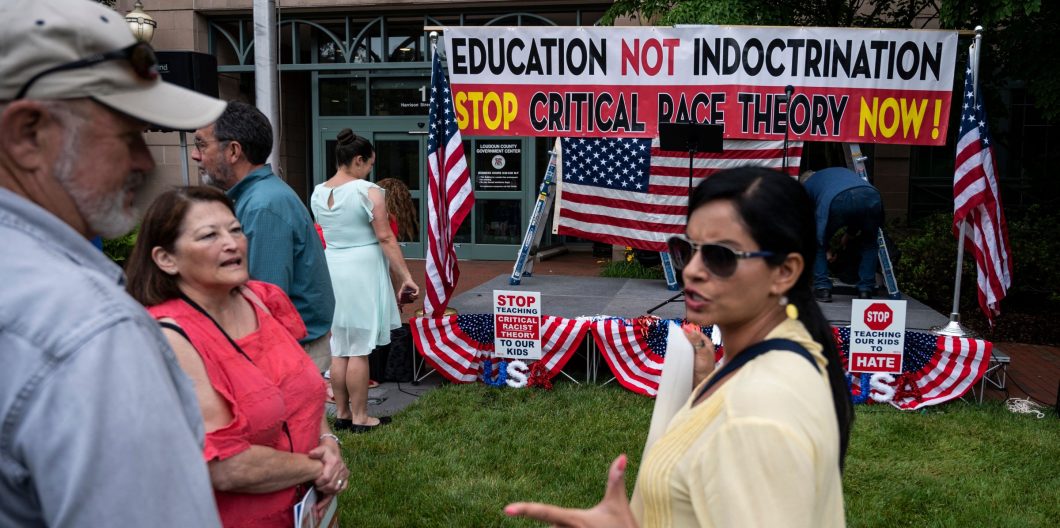Critical Theory, and now Critical Race Theory, are fully-loaded howitzers aimed at all the pillars of the system.
Waking up to Woke Education
Citizens are awakening to the dangers Critical Race Theory and its associated theories pose to our country.
What should awakened Americans seek to accomplish? All of that depends on how deep our institutions are infected with these pernicious ideologies. A realistic assessment of the threat comes before a realistic strategy for dealing with it.
On this score, critics of the woke ideology must realize how far CRT and its associated theories have penetrated America’s educational institutions. CRT is not some fly-by-night fad. CRT, its associated ideologies, and multiculturalism are different ways of expressing our reigning civil rights ideology, which holds that all group disparities, disadvantageous to supposedly aggrieved minorities, are traceable to systematic discrimination. It has been America’s establishment ideology for two generations.
The intimate connection between CRT and its associated theories and multiculturalism means that much of this ideology is sewn into the very nature of the educational enterprise in America. One startling fact captures the connection between CRT, its associated ideologies, and multicultural education: Robin DiAngelo, who catapulted to fame and big speaker’s fees for her book, White Fragility, wrote her dissertation at the University of Washington under the direction of James A. Banks, the little-known, but highly influential father of multicultural education. Schools of education around the country integrate these ideologies into teacher preparation. Accreditation demands multicultural education, functionally equivalent to the CRT ideology in its anti-racism bent. Teacher certification programs are infused with it, as are state standards for culturally responsive teaching or social and emotional learning. Curricula are infused with descriptions of America as a multicultural nation. Many school districts and private schools are now openly adopting CRT. This just makes more public what has been there for decades.
Both CRT and multiculturalism are based on the idea that America and the West generally are systematically racist. Both are based on the idea that institutions unwittingly privilege the dominant culture to the disadvantage of supposedly aggrieved minorities. When those institutions affect races or sexes differently—when they have a “disparate impact,” in the Supreme Court’s words—government can safely assume that there is some systemic discrimination at its root. Both call for a fundamental transformation of American institutions—but especially America’s schools—to remedy this disparate impact. Both point to the triad of “diversity, equity, and inclusion” as necessary to carry out this transformation.
Education institutions are beholden to this ideology. The question is what to do about it.
Many states, including Idaho and Tennessee, have responded to the very public push to ban CRT indoctrination or ban certain events or curricula. This is legitimate. If school districts can mandate “Black History Month,” political authorities can also ban the same activities. It is also understandable that citizens lash out and seek to exercise political power in this way. Taking over school boards to “ban” CRT is a laudable exercise of self-government.
The most pressing question, however, is whether banning CRT will reform schools. The American Federation of Teachers and the National Education Association both intend to bring CRT and its associated ideologies into every American school district, despite the bans. Many teachers see promoting these ideologies as part of their job. Some teachers vocally oppose all CRT bans and have signed pledges to disobey them. Others intend to take their efforts underground, actually playing out their opposition to the supposedly racist system in what they do or say.
Bans may be nice in theory, but they face grave obstacles in execution. Can the school boards or state boards, who, after all, adopted or acquiesced in these policies, be expected to execute the bans? Will teachers self-report? To what effect? Can parents ever gather enough information with sufficient certainty to take districts to trial? Will judges and juries convict? Imagine a teacher accused of CRT indoctrination. Would a judge render favorable decisions? Would a jury of that teacher’s peers convict? The whole show trial would allow the teacher to play the part of the Hollywood Seven, to moralize and play the victim of the lynch mob, without the system as a whole touched at all.
Thinking that such bans will actually fix the problem would foster a dangerous complacency. The same people, educated in the same credentialing system, will still be running the education show. They have the power in the system. They honor this vision of education. Whole industries have grown up providing textbooks and teacher training in these ideologies—they will not just shut down. Conservatives need to internalize the well-documented failures of the anti-affirmative action regime in California and elsewhere: institutions infused with an ideology will not comply willingly but rather seek to escape detection, punishment, and consequences.
The institutions themselves must be changed, but this is no small task.
One option of changing the institutions involves promoting “school choice,” private schooling, or even homeschooling. Government could fund education, but not administer it. Money would follow the child, as the school choice mantra goes. Thousands of white papers have been written on the benefits of school choice. Competition breeds excellence. Markets for non-conformist education will arise. Parents could choose from a diversity of schools—some with heavy-handed indoctrination in CRT and associated ideologies; others without it. The Left has built curriculum and training and won over institutions. Conservatives allowed it to happen (and funded it, actually). Nor have conservatives built much curriculum themselves. Instead, arriving late to the game, they have asked for an opt-out.
The only way to beat bad, corrupt institutions is with new, uncorrupt ones. This means first dismantling the current institutions, with popular support and with intelligent leadership.
The efficacy of school choice is greatly overrated. School choice prevails—with thriving private schools and public schools—in higher education, but nearly every institution of higher education is exactly the same. Perhaps this is due to the accreditation process where federal funds only flow to properly accredited institutions. Perhaps it is because professors and administrators are all produced by the same higher education credentialing method. Perhaps they all just soak in the Zeitgeist. Whatever the reason, our higher education monoculture proves that “school choice” when it is connected to a corrupt system of honor and money is not enough. Hopes invested in school choice assume away the political context within which choices are made or are allowed—and that political context must be changed to make school choice effective. Choice itself might help change that context, but choice alone is not enough.
School choice advocates are insufficiently radical, in that they do not touch the system of power, honor, and credentialing dedicated to our reigning civil rights ideology. States may oversee the genuine choice almost out of existence through their mechanisms of control (as California does to homeschooling). School choice advocates ignore the incontrovertible and highly relevant fact that someone is always determining the nature of education in a society. The hope to beat a power center through dispersing power while leaving the power center in place is a fool’s errand.
School choice efforts cause those who run the system to complain. School choicers are attacking teachers, they will say. They will complain about “brain drains” as charter schools or private schools take the best students or the best teachers. The poor will be left behind. Money will drive the system. These are all so much performance art. Every time opponents of our reigning civil rights ideology arise to act those in the system will moan and complain. Those in the system love and honor the system; their interest is tied to it. They will appeal to any pseudo-argument to maintain it. But that wailing and gnashing of teeth does not mean reforms will be effective.
The only way to beat bad, corrupt institutions is with new, uncorrupt ones. This means first dismantling the current institutions, with popular support and with intelligent leadership. Efforts to ban CRT and its associated ideologies may help conjure up popular support for dismantling the system. A political community that adopts school choice has already come to hold the purely public system in lower esteem. Efforts to expose the public system for what it really is are indispensable prerequisites for a fundamental dismantling of the corrupt system.
State legislatures could get out of the business of banning and get into the business of demanding—demanding that certain conclusions about American history be delivered, for instance. Legislatures could require that schools spend three weeks on the American Revolutionary War, and that they know the role played by George Washington, Alexander Hamilton, the Articles of Confederation, Benedict Arnold, Saratoga, Yorktown, the meaning of the Declaration, the participation of the French, the incomplete movement toward the emancipation of slavery in some states and so on. Perhaps the Hillsdale K-12 History curriculum could be adopted.
School days could be shortened. Standards should be adopted so that there is no room for anything else. All curricula could be put online. Teacher training could be put online. A back-to-basics approach to math. Legislatures could even demand that certain reading books be adopted, certain science curriculum. A demand that students learn the parts of speech, diagram sentences, and so on. Legislatures should demand results in line with a new rigorous education—or threaten funding.
Tons of money is shoveled into our school systems and there are no effective accountability mechanisms. We tend to treat education as if it were a scientific domain of experts. Education is always political, and experts alone have revealed that they cannot be trusted with it. Only political dictation to education institutions can work in the short and medium term, until a new elite taken with a vision of civic renewal can arise. Here’s hoping many people are working on that project too.



